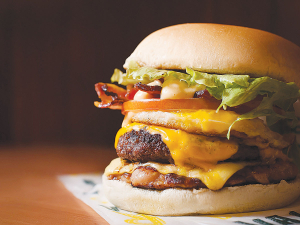Fonterra upgrades Eltham cheese production for global growth
Fonterra's Eltham site in Taranaki is stepping up its global impact with an upgrade to its processed cheese production lines, boosting capacity to meet growing international demand.
 Last year 60.7 million kg of NZ beef was exported globally to other McDonald's markets - this was on top of the 6.5m kg was used locally.
Last year 60.7 million kg of NZ beef was exported globally to other McDonald's markets - this was on top of the 6.5m kg was used locally.
Fast food chain McDonald's spent nearly $500 million on New Zealand agriculture products last year.
While $175m of the ingredients - sourced from farmers, growers and bakers - were served locally, the company also exported $325m worth ingredients to its overseas stores.
McDonald's NZ annual shopping list, released last week, shows that it spent $119m more on NZ ingredients than the previous year.
Last year was also a record year for beef with a whopping 60.7 million kilograms exported globally to other McDonald's markets - an increase of 35.4m kg from 2020. In addition, 6.5m kg was used locally for Macca's 100% beef patties.
"New Zealand is one of the top 10 countries that supplies quality beef to McDonald's globally and is working within the industry and alongside government agencies such as AgResearch to develop more sustainable methods of farming" says McDonald's managing director David Howse.
"New Zealand suppliers were able to meet record demand for quality beef from international McDonald's markets in 2021, with other beef export countries struggling due to a variety of issues, including recovering from droughts and the pandemic."
Meat Industry Association chief executive Sirma Karapeeva says NZ farmers and meat companies are proud to be able to offer high-quality grass fed sustainable beef, grown and processed to the highest standards.
"Companies are listening to what consumers both in New Zealand and globally are seeking and this is reflected in their product offering.
"Being part of the McDonald's supply chain adds real value to New Zealand's red meat sector."
McDonald's buys nearly 90% of ingredients locally.
Howse says the company is even more proud to be sharig NZ quality produce with McDonald;s markets across the globe.
McDonald's markets throughout the Asia Pacific, Middle East and Africa purchased an additional $323m of produce right from New Zealand's backyard, an increase of $100m from 2020.
Along with grass-raised beef and cheese, this exported produce also includes 93,000kg of potatoes from Canterbury and 89,000kg of chicken from the Waikato.
"McDonalds value the long-standing partnerships we have built with local businesses since 1976 and it's something we will continue to support and grow for years to come," says Howse.
Controls on the movement of fruit and vegetables in the Auckland suburb of Mt Roskill have been lifted.
Fonterra farmer shareholders and unit holders are in line for another payment in April.
Farmers are being encouraged to take a closer look at the refrigerants running inside their on-farm systems, as international and domestic pressure continues to build on high global warming potential (GWP) 400-series refrigerants.
As expected, Fonterra has lifted its 2025-26 forecast farmgate milk price mid-point to $9.50/kgMS.
Bovonic says a return on investment study has found its automated mastitis detection technology, QuadSense, is delivering financial, labour, and animal-health benefits on New Zealand dairy farms worth an estimated $29,547 per season.
Pāmu has welcomed ten new apprentices into its 2026 intake, marking the second year of a scheme designed to equip the next generation of farmers with the skills, knowledge, and experience needed for a thriving career in agriculture.

OPINION: Here w go: the election date is set for November 7 and the politicians are out of the gate…
OPINION: ECan data was released a few days ago showing Canterbury farmers have made “giant strides on environmental performance”.